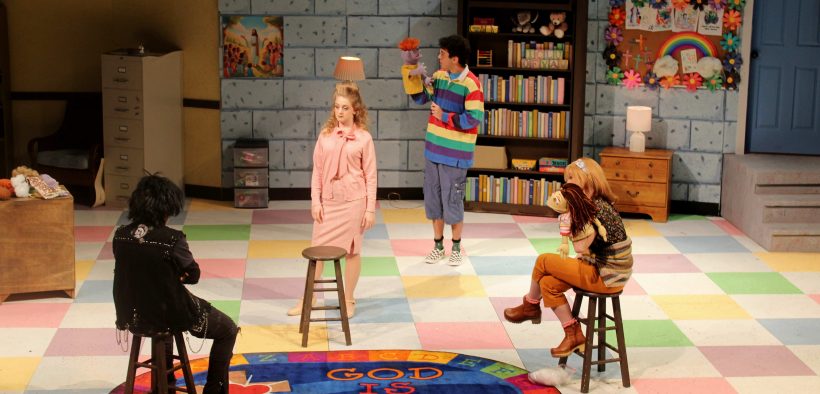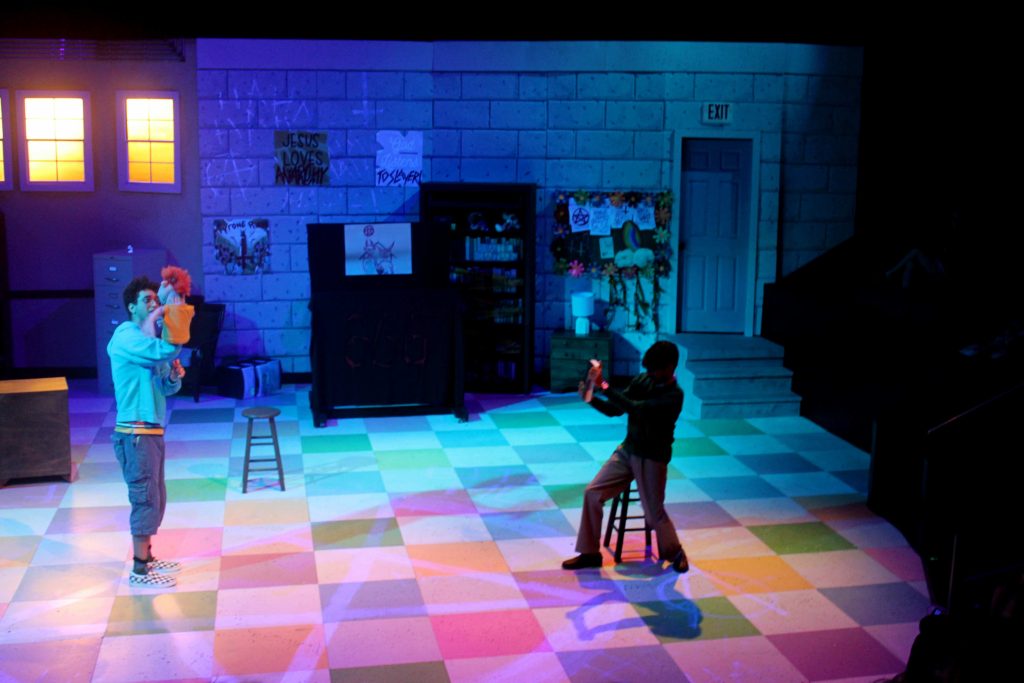The Thing about the Devil: Sarofim School of Fine Arts Shines Bright in Hand To God
Share

The mood is electric as audience members clamber through the entrance to the Jones Theatre on October 18, 2024. Ushered in by stagehands, cheerful audience members approach an intimate, almost familial stage, balanced with warm hues of green, blue, and yellow. Viewers are handed a program titled “Hand to God.” Indeed, in some ways, those first few moments set the stage for the rest of “Hand to God”—intriguing and more than a little mysterious. “Hand to God,” directed by Julia Cheteson and presented by the Sarofim School of Fine Arts, is adapted from the play by Robert Askins. It first premiered in October 2011.
The play follows Margery (Audrey Thimesch ‘27) and her son Jason (Connor Bustos ‘26) as they recover from the loss of their husband and father by burying themselves in working on a puppet show for their local church. As Margery struggles against the manipulative designs of several men in her life, Jason struggles with his demons—characterized by a foul-mouthed, crass puppet named Tyrone, who just might be the devil. As pressure mounts and Tyrone’s behavior becomes more sinister, Jason must reckon with conflicts with the authority figures and blooming feelings for his close friend Jessica (Piper Swisher), while Margery finds herself dealing with the machinations of young teenage punk Timmy (Olivia Hynes) and the wiles of Pastor Greg (Ansh Tripathi ‘28). I hesitate to say more, as the direction this play goes is often unpredictable. Both a dark, sad meditation on the nature of evil and a madcap farce, “Hand to God” is an absolute delight.
I would characterize the play that unfolded before me on that Friday night as an absolute maelstrom of talent. Every aspect, from the technical to the narrative, is at the top of its game. The mise-en-scène is punctuated by eccentric, keenly detailed set and prop designs, along with kinetic, dynamic lighting. All of these elements come together to provide an incredibly cinematic feel. I cannot praise the stage design enough. Isabella Morrow, class of 2024, orchestrated several elaborate, well-engineered pieces that convert a relatively small stage into a seemingly infinite setting. The production department harnesses exterior and interior settings effortlessly, and the play becomes all the more immersive for it. To keep from spoilers, I will add that several key plot points in the play result in some truly stunning set pieces.
The play simmers with equal parts melancholy and humor. Though the cast is small, each member gives a fantastic performance. If there is one word I would use to describe this play, it’s “empathetic.” The narrative of the play intricately explores the flaws and strengths of its characters, making it an absolute feast of material for the very talented actors. Audience members laughed at the sharply honed wordplay as they dealt with the emotional moments. More than anything, “Hand to God” reminded me of what theater is supposed to be—a fundamentally communal experience. You will laugh and cry with audiences of people you may not even know.

Thimesch describes her experience portraying Margery: “Grief has been such an interesting emotion to portray because it manifests in such strange ways. I knew that in preparing for the role, I had to do that grief justice. I could not let the shock outweigh the intended messages of the play. Within this idea of appropriately portraying grief, I knew that in order to sell these moments of being aggressive, raw, and strong-willed, I had to significantly contrast them.” Hand to God’s cast of characters is made up of fundamentally flawed people. Tripathi talks of playing the manipulative Pastor Greg: “Greg as a character really spoke to me because he’s a character that not only feels like he’s doing wrong but that you can’t blame him for it because that’s his perception of the right thing. Playing a character like that has a certain type of nuance that you have to bring, which can really elevate the experience for both the actor and the audience.”
One of the most incredible aspects of the play was Connor Bustos’s dual performance as Jason and Tyrone. The contrast between these characters forms the heart of Hand to God and the difference truly is night and day. It just goes to show the sheer range of this actor’s ability that he can switch characters almost instantaneously and bring life, personality, and character to each of them. These characters truly do feel distinct in every possible way, and I feel that is a true accomplishment.
If you ever have the opportunity to see the play, I would highly recommend doing so!
Correction Notice: the theatre was Jones Theatre, not Alma Thomas Theatre, the opening date was October 18, not October 17, and Isabella Morrow is class of 2024, not 2025.
